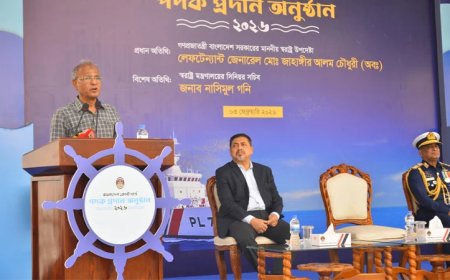Tahmeed: The First Bangladeshi Director of icddr,b Leading the Fight Against Malnutrition
Tahmeed Ahmed, the first Bangladeshi executive director of icddr,b, has been recognized in the ‘TIME100 Most Influential People in Health of 2025.’ As one of the dedicated global figures working tirelessly to eliminate malnutrition, this researcher shared his journey.

Tahmeed Ahmed recently returned from New York, where he attended the ‘TIME100 Impact Dinner: Leaders Shaping the Future of Health’ at the invitation of TIME Magazine. Following the publication’s long-standing tradition, he also delivered an inspiring speech at the event.
We spoke with him on May 24 at icddr,b (International Centre for Diarrhoeal Disease Research, Bangladesh), beginning with his recognition by TIME. The conversation soon expanded to cover many aspects of his life and career.
Starting with a Modest Salary
Tahmeed Ahmed graduated with an MBBS from Mymensingh Medical College in 1983. After a brief stint in government service at the Ishwarganj Upazila Health Complex, he joined icddr,b as a medical officer the same year. “I took the job at icddr,b partly on my elder brother’s advice, as it allowed me to live in Dhaka,” he recalled. “My first month’s salary was about Tk 2,500.”
At that time, the institute was dominated by foreign scientists, with most senior roles held by expatriates. The renowned paediatrician Roger Eeckels was the executive director. Tahmeed said, “I never imagined I would one day become executive director of icddr,b. It was never a goal or ambition of mine.” When asked if he had planned to specialize in nutrition, he responded, “No.”
While working in the icddr,b hospital, Tahmeed witnessed the harsh realities of malnutrition firsthand. “Every day, I saw children suffering from severe malnutrition, many of whom died despite our efforts. Night blindness due to malnutrition was widespread. This direct experience inspired me to focus on nutrition.”
His early career gave him the opportunity to collaborate with nutrition experts from Europe, America, and international organizations worldwide. He was especially inspired by the contributions of Bangladeshi figures like World Bank official Iqbal Kabir and icddr,b scientist SK Roy.
Over time, Tahmeed progressed through various roles at icddr,b. In December 2015, he became senior director of nutrition and clinical services. At the start of the COVID-19 pandemic in 2020, he was appointed acting executive director, and early the next year, he officially became the executive director—the first Bangladeshi to hold this position in icddr,b’s 60-year history.
Balancing Leadership with Research
Malnutrition often remains overlooked in health policy and media, yet Tahmeed has made it the focus of his research. To date, he has authored or co-authored 514 research papers published in leading international journals across health, public health, medicine, and science. He currently leads or participates in nearly a dozen international research projects related to malnutrition.
With icddr,b’s workforce now exceeding 5,000 employees, leading the institution while maintaining an active research portfolio is no small feat. Tahmeed continues to dedicate long hours to both.
At the TIME Impact Dinner in New York on May 13, he shared insights from four decades at icddr,b, focusing on his malnutrition work. Discussing a decade-long collaboration with Jeffrey Gordon of Washington University in Saint Louis, he said, “Many assume malnutrition is caused solely by lack of food. While food scarcity is a major factor, it’s not the only one.” He explained, “Our research shows that poor hygiene allows harmful bacteria to colonize children’s small intestines, damaging them. This damage prevents proper nutrient absorption, leading to malnutrition.”
Nutrition is also linked to food choices. Some children thrive on the same diet that leaves others malnourished. Tahmeed and his team discovered that children’s guts vary in their ability to absorb micronutrients.
The gut microbiome plays a crucial role. Foods like tilapia fish, chickpeas, green bananas, and peanuts encourage growth of beneficial microbes. Using these ingredients, researchers developed specialized food products through local companies.
These foods are now being distributed to mothers and children in Bangladesh, India, Pakistan, Tanzania, and Mali as part of an international research study. Nutritionists worldwide are eagerly awaiting the study’s results.
Three months ago, before a nutrition event hosted by Prothom Alo, this reporter asked Tahmeed, “What should we eat to keep our gut healthy?” He replied simply, “Green bananas and chickpeas.”
Childhood and Education
Though his ancestral home is in Mymensingh, Tahmeed grew up in Old Dhaka. His father’s job took the family briefly to Pakistan during his youth.
He passed his Secondary School Certificate (SSC) exams in 1974 from St Gregory’s High School in Lakshmibazar, Dhaka. He fondly recalls advice from the headmaster, Brother Robert: “The world is becoming more complex. Do something that ensures you won’t be unemployed.”
After SSC, Tahmeed attended Notre Dame College and later joined Mymensingh Medical College in 1976. There, he engaged actively in student politics, often debating Marxist ideas late into the night. He was also involved with the organization Sandhani, participating in blood and eye donation campaigns across Bhairab and Jamalpur districts. “I have many funny stories about traveling by train, sometimes without tickets, and how conductors would treat us to peanuts,” he said.
Family and Personal Life
In his final year at medical college, Tahmeed crossed paths with Sayera Banu, who was just beginning her studies. Though both studied at Mymensingh Medical College, they only met later while working at icddr,b in junior roles. They married in 1992. Sayera Banu is now a senior scientist and head of the emerging infections division at icddr,b.
Despite his demanding career, Tahmeed maintains a rich personal life. He regularly meets with old friends and stays connected. “Just last week, I caught up with some school and college friends,” he said.
Asked about other interests, he shared, “In the evenings, my wife and I watch TV talk shows and discuss the country’s political direction.”
He also finds joy in teaching as a professor of public health nutrition at the James P Grant School of Public Health at BRAC University. “Students come from all over the world. I love engaging with them, teaching, and learning alongside them,” he said.
What's Your Reaction?
























































































